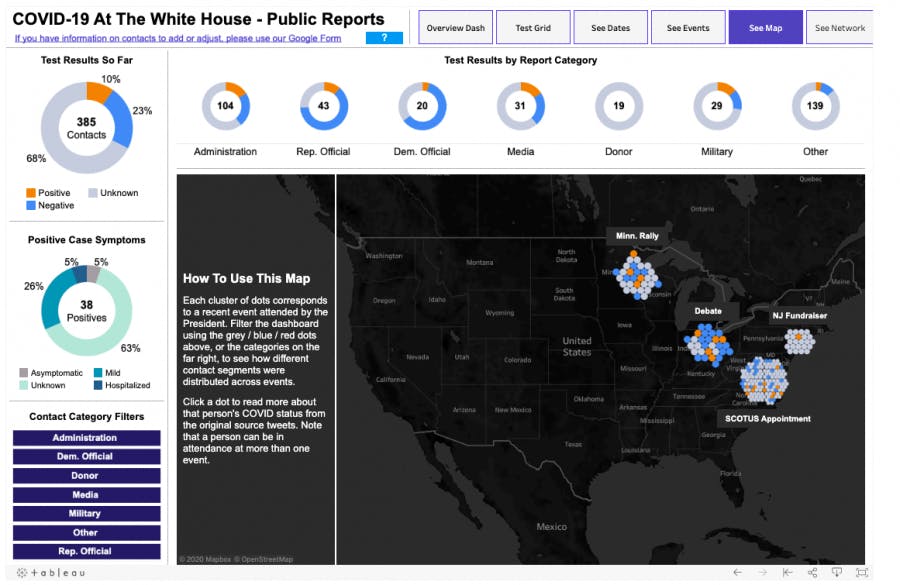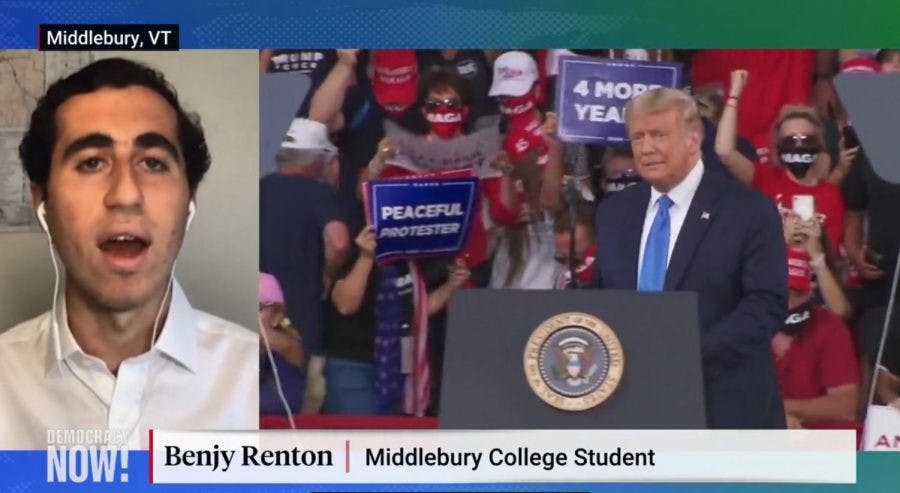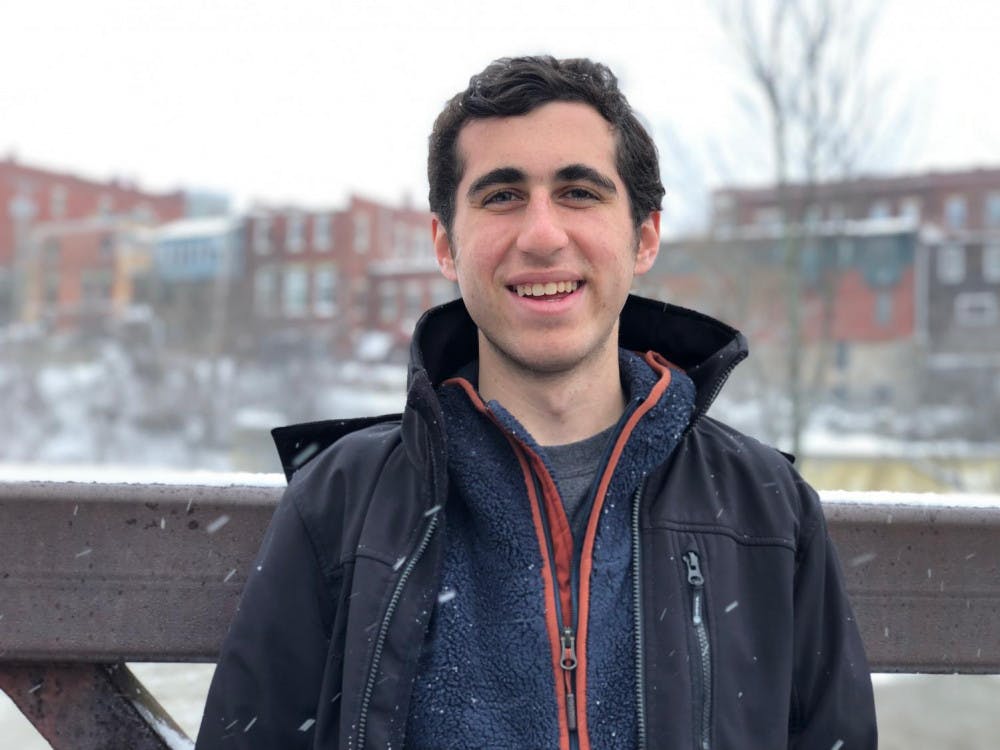Benjy Renton ’21 has spent the better part of the past six months covering the Covid-19 pandemic with his weekly “Where We Stand with Covid-19” reports. But not even Renton could have anticipated his new beat when, in the early hours of Friday, Oct. 2, his friend and Middlebury Campus colleague James Finn ’20.5 sent Renton a tweet: President Trump had tested positive for the virus.
“We’ve begun the monumental task of contact-tracing the President of the United States,” Renton said in an interview with The Campus.
By the end of the day on Oct. 2, Renton had joined forces with Peter Walker, a data visualization specialist who spearheads the Covid-19 Tracking Project for The Atlantic, and Dr. Jesse Owens, an infectious disease fellow and internal medicine doctor at Emory University, to construct a Covid-19 dashboard that mapped the president’s contacts and infection status.

Although the dashboard is not intended to be a stand-in for the scientific contact tracing process, it is one of the most comprehensive public trackers of the president’s contacts. In two days, the dashboard garnered 370,000 views. As of press time, the dashboard has reached over 764,000 views.
“We’ve decided to do this as a public-facing dashboard,” Renton said. “The American people deserve to have all the information in one place.”
One would think contact tracing the president would be a simple task given his hyper-visibility in public spaces. But prior to testing positive, Trump had been to a long list of places: the White House Rose Garden ceremony, during which Trump announced the nomination of Amy Coney Barrett to the U.S. Supreme Court on Sept. 26; the presidential debate on Sept. 29; and campaign rallies in Minnesota and New Jersey on Sept. 30 and Oct. 1.
Renton and his colleagues have parsed through news media accounts of these events, identifying each individual present and following each thread of contacts as new individuals test positive. They also have a tip line where people can anonymously submit information or contacts to add to the dashboard. The tip line has received 512 submissions since the dashboard was created, and Renton is the one responsible for adding all of this information.
“It’s kind of like a family tree,” Renton said. “But the family tree is the three branches of the U.S. government.”
The dashboard has since been picked up by Forbes, New York Magazine and the BBC.
Walker said Renton has a “doggedness” that allows him to jump into situations that may seem messy. Renton’s work, according to Walker, is “on-par with anything [he has] seen” in the academic or scientific world.
“I think the key is that he’s able to recognize the opportunity and able to fill a knowledge gap,” Walker said in an interview with The Campus. “He has a clear sense of right and wrong, and that has pushed him to do work that he feels is of the moment and not only valuable but necessary.”

Renton’s journey in covering Covid-19 has been a personal one: he was studying abroad in Beijing, China when the pace of the pandemic began to accelerate in mid-January of this year. The study abroad program was canceled and all students were sent home in late January. Renton began his spring semester at Middlebury in February — only to be sent home from Middlebury once again after the college was evacuated in mid-March. Renton returned to his hometown in Rye, N.Y., proximal to the American epicenter of the pandemic in New York City.
“I think I have a unique vantage point of seeing the outbreak in China, seeing the outbreak in New York, and now seeing the outbreak on a college campus,” Renton said. “If you think of phases of pandemics, those are key phases that the U.S. and the world has fought.”
What began in 2014 as a blog called “Off the Silk Road,” where Renton wrote about his trips to China prior to college, soon evolved into an update for friends and family about the state of the pandemic. In mid-April, Renton ramped up his coverage with weekly reports called “Where We Stand with Covid-19,” a forum that is equal parts blog, website and newsletter, drawing from scientific research, op-eds and news media about Covid-19.
Renton said he structures his weekly reports a bit like a news broadcast, with an introduction containing the week’s national news headlines which may or may not be pandemic-related.
Subsequent segments contain information on things like vaccines, the latest scientific studies, K-12 schools and study abroad information. Renton created one unique segment called the College RidicuList, which contains a bulleted list of “quirks of college reopening plans.” Another segment is called “The Good Stuff,” which is a list of Renton’s favorite feel-good headlines from the week’s news.
Renton relies on graphics and visualizations to display this information, and he makes many of these himself. Every week he updates the College Watchlist, which maps incidents of positive Covid-19 cases in higher education across the country during the last seven days. The map tracked 98,965 cases at 91 institutions, according to Renton’s Oct. 11 newsletter. Renton updates these numbers by hand every week. The process of writing these newsletters takes around 7 hours each week, Renton said.
“I think it’s important to see the general pulse of the nation,” Renton said when asked why he combines mainstream news reporting with coverage of the pandemic. “I think it’s really important to acknowledge those events because I think it’s a transformative part in history, and it’s one that needs to be discussed for a minute.”
Renton is a news junkie. At the height of his news consumption over the summer, Renton said he was reading 500 articles per week. He said he pared down that consumption a bit once school began, watching some cable news each day; reading national, local and college papers; and subscribing to a variety of scientific and health publications or newsletters.
“Benjy has a voracious appetite for the news and is really good at hopping on whatever is occurring out in the world and adding his own flair to how it’s reported, whether it’s data or adding analysis,” said Sabine Poux ’20, who served as the Editor in Chief for The Campus last year.
Despite being a full-time student, Renton’s coverage of the pandemic has not slackened. Renton is in the process of co-authoring a scientific paper that analyzes the reopening plans of 500 institutions of higher education across the United States, along with researchers from the California Institute of Technology and Johns Hopkins University.
Renton also has plans of researching “college” counties, a designation given to counties where college students compose at least 10% of the population.
Nobody is certain when the pandemic will end, not even Renton. For now, he plans to continue carving out his niche in higher education and Covid-19 tracing research, contributing to a historical record of life during the pandemic.
“The pandemic is all of our stories,” Renton said.
Editor’s Note: Benjy Renton ’21 is The Campus’ Digital Director.
Benjy Renton ’21 garners national recognition for contact tracing the White House

Renton is part of a team of three building an interactive visualization that contact-traces the President. Renton updates the dashboard daily. (Courtesy of Benjy Renton)
Renton appeared on Democracy Now!, a national news program, on Oct. 6 to talk about his work contact tracing the President. (Courtesy of Democracy Now!)
Comments



